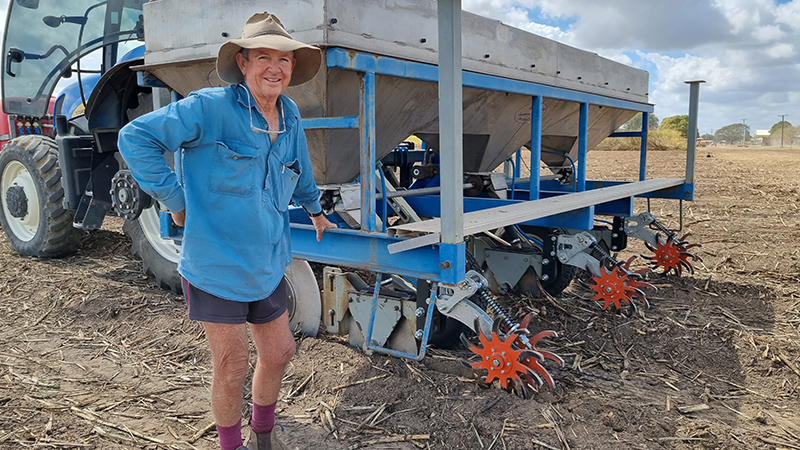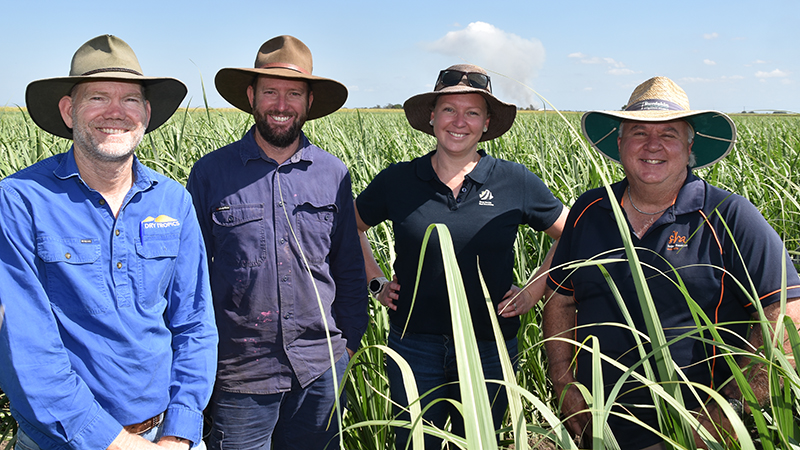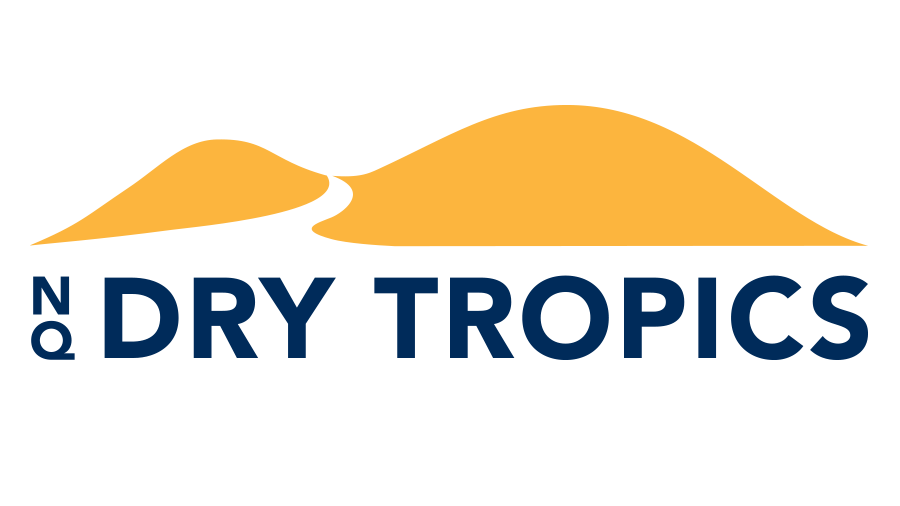Major Grants
(Part of the Lower Burdekin Water Quality Program delivered by NQ Dry Tropics, supported by Sugar Research Australia and agronomy service providers Farmacist, AgriTech Solutions and Aglantis.)
AT A GLANCE
-
33 projects, involving 32 landholders managing 4,455ha.
-
5,882kg/year reduction in DIN.
-
5 GPS units – 1,702ha.
-
9 Rate controllers installed across 1,398ha.
-
14 irrigation automation projects involving growers managing 1,978ha.
-
11 irrigation scheduling tools – 1,201ha.
-
8 Stool Zippas – 1,195ha.
NQ Dry Tropics Sugar Project Officer Sarah Willis with Home Hill cane grower David Fowler.
DAVID FOWLER
Cane grower David Fowler saved water, time, and money by installing an automated irrigation system on his 41-hectare farm at Osborne, on the Burdekin River.
Since acquiring his family farm seven years ago, David Fowler has focused on improving his infrastructure to reduce energy consumption, improve water use efficiency and minimise surface and deep drainage irrigation loss.
“At first I thought there’s got to be a better way to do this irrigation,” David said.
“It was so time consuming, and by over irrigating we were pumping a lot more water out from underground than we needed.
“I had been looking to automate since I bought the farm, but when I first met with Steve Attard from Agritech Solutions, he said I needed to look at pump efficiencies, power costs, pipeline sizes and outlets. He put the data in a graph, which showed me all my inefficiencies, and the dollar cost.”
Agritech Solutions provided David with a comprehensive Automation Plan detailing the specialised technical and agronomic advice necessary when making this degree of investment.
Grower David Fowler.
“We went through everything. It was a huge amount of work in the long run, and there was a lot of learning too. Now that I’ve got all the information, it’s just easy.
“My first priority was getting all my pumps running as efficiently as possible. Next was installing pipelines to the outlets and the last step was automation.”
He said long-term plans to install an automated irrigation system had been accelerated thanks to the Major Grants Project under the Lower Burdekin Water Queality Program.
“It would have taken another three to five years to get there, because farms aren’t that cheap, so you don’t have a lot of money to spend straight up.” he said.
How it works
David opted for an automated system developed by local company Electrical and Automation Solutions (EAS), which had been installed on the farm he helps manage at Mt Alma.
He said he had the opportunity to see the system in action while working at Mt Alma and had been struck by its ease of use.
He worked closely with EAS to ensure the system was perfectly tailored to his needs, and he couldn’t be happier with the outcome.
He said the entire system was controlled from a screen in his shed via two telemetry networks — one high-speed Wi-Fi to remotely control the pumps, and a lower speed connection for the end of row moisture sensors, which inform him when water has reached the end of the furrow.
“You push the moisture sensor in the end of your row, and as soon as it detects water it will send a message to the control network, which will change it to the next set or turn your pumps off,” he said.
“I like the fact it is super easy to install. If you find and end-of-row sensor is in the wrong spot, you can move it. It takes two minutes.”
He said he was reaping the benefits after only a few months, with a 36 per cent reduction in time taken to water the whole farm.
“I used to run 10 to 12-hour sets because I was never home to change them, so they would run from around 5am to 5pm,” he said.
“It used to take 76 to 78 hours to water the whole farm, and lately we have been doing it in
48 hours.
“I definitely plan to automate our other farm.”
More time with the family
David said the ability to irrigate remotely from his mobile phone had enabled him to focus more on his family.
“The time I’ve saved, I can spend more time with my little boys,” he said.
“I like to get away on a weekend and go on holidays with the family, but during the season you’re pretty much tied here if you can’t irrigate remotely.
“But with automation I just need to go for a drive around the farm once a week just to check everything and that’s about it.
“We are also running four cameras you can log into remotely, it’s another safeguard, I can be on holiday, log into the camera and see things are going okay.
Record keeping a breeze
David said the system reduced watering time and took the pain out of data collection and record keeping.
He said it kept a digital record of every irrigation event, with the information sent to the irrigation scheduling tool IrrigWeb.
“The system records everything for me,” he said.
“We can tell how much power was consumed and we know the price, so we can calculate the cost to irrigate that set… all stored in the cloud and backed up.
“At the end of the year I can look at running irrigation costs and water usage per block.”
Importance of stewardship
It is clear to see the pride David takes in the knowledge he is doing the right thing for his business and for the Great Barrier Reef.
“I’m a fifth-generation sugar cane farmer, and I’d like my boys to be the sixth, so we need to make the future a good place for them.
“So, by doing the automation, I think we’ve not only saved money but we’re saving the environment as well.”
FURTHER READING
LOWER BURDEKIN WATER QUALITY PROGRAM
Stool Zippas

NQ Dry Tropics’ Major Grants project encouraged growers to invest in equipment, technology or agronomic services to reduce the amount of nitrogen fertiliser applied to their crop. Some opted for Stool Zippas .
READ MORE>>
Innovations Day

Lower Burdekin cane growers heard about the “latest and greatest” innovations available to improve efficiency, profitability and sustainability at a Field Day on Aaron Linton’s Home Hill farm recently.
READ MORE>>
Program home

Between 2020 and 2024, more than 100 cane growers have improved irrigation, nutrient and pesticide management, resulting in widespread practice change and significant water quality improvements.
READ MORE>>
Irrigation project

Wilmar Sugar and Renewables and Ross and Lisa Parker’s farms are the subjects of two case studies under this project.
READ MORE>>
Precision-Decision

Giving growers a better understanding of soil types, better control over application of soil ameliorants and better data for long-term decision-making on-farm.
READ MORE>>
Bluewater

Optimising the amount of pesticide and the delivery of pesticide can save growers thousands of dollars, but it also helps to reduce run off and loss of chemical that could end up in waterways flowing out to the Great Barrier Reef.
READ MORE>>




